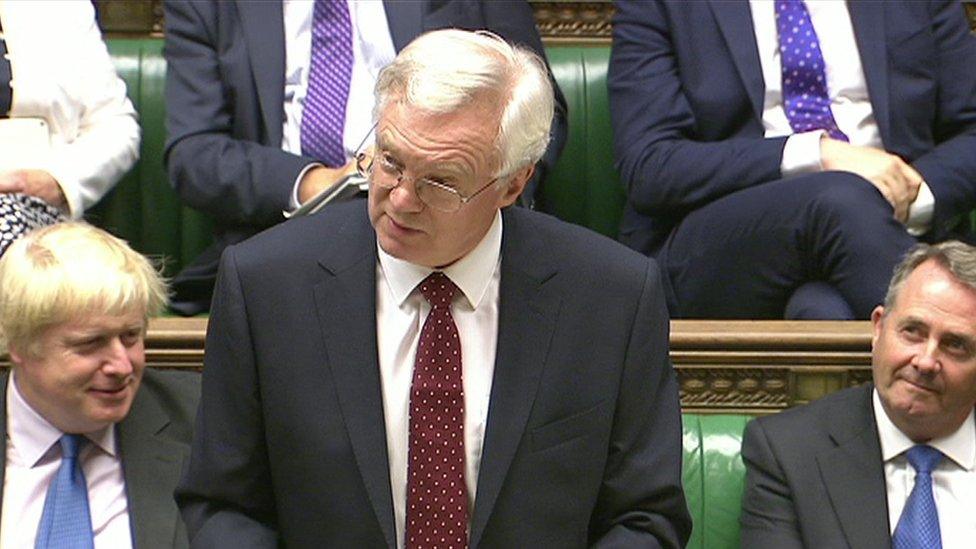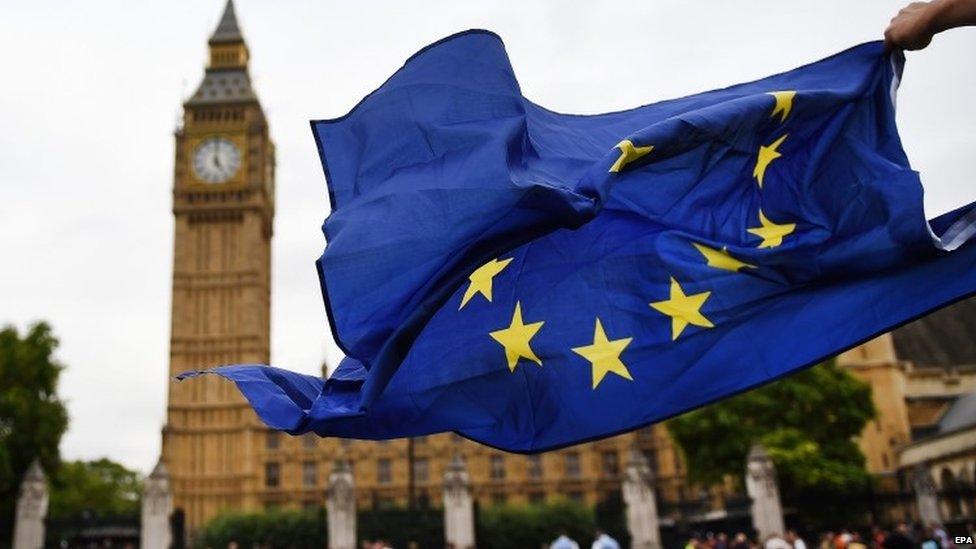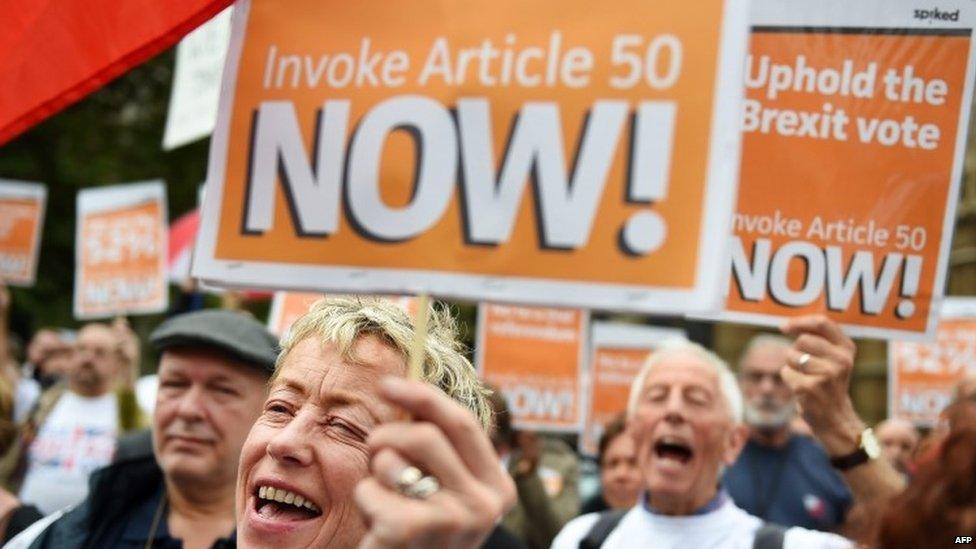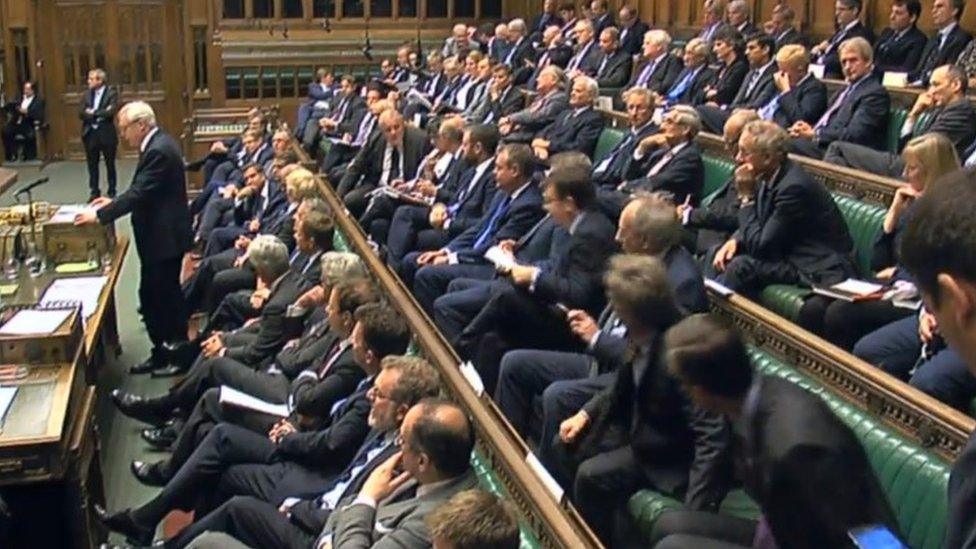Government wants Brexit 'national consensus'
- Published

The negotiations could be among the most complicated in history, Mr David said
The government will seek a "national consensus" and "take the time to get it right" as it leaves the EU, new Brexit Secretary David Davis has told MPs.
In his first Commons statement in his new job, Mr Davis said the forthcoming negotiations would be an "exciting and considerable challenge".
The UK's departure will be formally triggered "as expeditiously as possible", he said.
Opposition MPs accused him of "waffle" and lacking detailed proposals.
Mr Davis was flanked by Foreign Secretary Boris Johnson and International Trade Secretary Liam Fox - who both campaigned for Brexit - as he addressed MPs on the progress made since the 23 June vote to leave the EU.
He said the referendum had delivered an "overwhelming mandate" and that there would be no attempt to "delay, frustrate or thwart" the result.
"Naturally, people want to know what Brexit will mean - simply put, it means leaving the European Union," he said.
'Beyond doubt'
Mr Davis said the government would be guided by "clear principles" - the search for a national consensus, putting the national interest first, acting in good faith towards other EU countries, aiming to "minimise uncertainty" and to put the "sovereignty and supremacy of this parliament beyond doubt".
He faced questions - including from former Tory minister Nicky Morgan - about the importance of retaining access to the EU single market, saying he did not accept this would involve a "necessary trade-off" with accepting the free movement of people.
He later said that if a requirement of single market membership was to give up control of UK borders "that makes it very improbable".

Pro-Brexit supporters made their voices heard outside Parliament while Mr Davis spoke

They called for the UK to begin official talks on leaving the EU straight away
Urged by ex-Tory leader Iain Duncan Smith to confirm that taking control of the UK's borders was "not negotiable for any other deal", he said Prime Minister Theresa May had "made it very plain that the current status of immigration cannot go on and we will bring it to an end as part of this process".
Mrs May has rejected one of the key pledges of the Vote Leave campaign - a points-based system for EU migration.
Mr Davis said the PM had been concerned this system was "too open-ended" and in fact wanted a model that would be "more robust, not less".
There was also a suggestion from former Conservative Cabinet minister Owen Paterson that the UK could accept all EU laws onto the statute book before abolishing the ones it did not want.
'Empty platitudes'
Mr Davis said it was not quite so straightforward, because of the way EU law interacts with domestic statutes.
The government says it will not trigger Article 50 of the Lisbon Treaty, which begins two years of formal negotiations, this year and has yet to set out in detail what it wants to achieve from the talks.

Mr Davis was making his first speech as a government minister since 1997
Responding in the Commons, Mr Davis's opposite number, Labour's Emily Thornberry, said: "The spin before today's statement was so much promise - we heard we were going to hear what the government's strategy for Brexit was.
"But what we've heard instead hasn't been a strategy, it hasn't been a thought out plan, it's just been more empty platitudes from a government that just continues to make it up as it goes along."
And the SNP's Tommy Shepherd urged the government to consider "in good faith" the case for Scotland to negotiate its own separate arrangement with the EU.
Speaking later to journalists, Mr Davis said the EU negotiations could turn out to be "one of the most complicated in history if not the most complicated" but that securing a free trade agreement without undue strings attached was not out of the question.
"About forty countries have free trade agreements with Europe without any deals on migration, without any deals on money," he said.
"If we do a free trade agreement with Europe it will be beneficial for both sides, as it were, on its own two feet, without having to pay anything to do it. That's what we're aiming for."